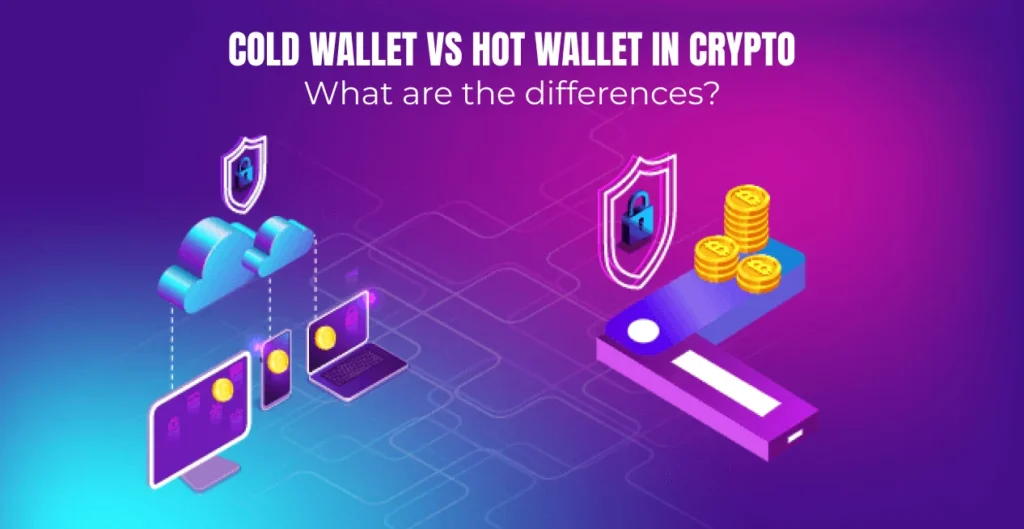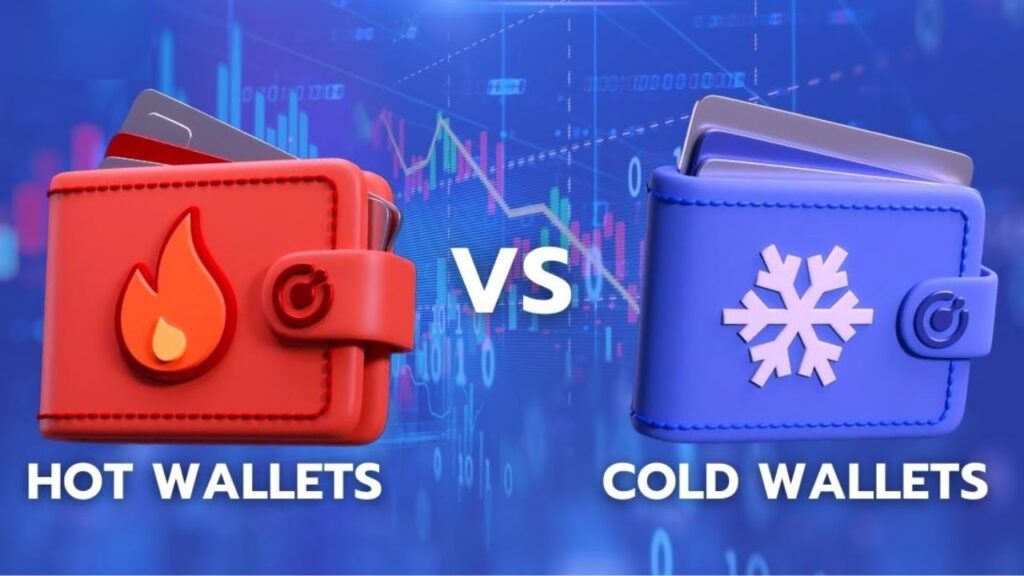Introduction

So, you bought some crypto—congrats! 🎉 Now what? If you’re still keeping it on an exchange, it’s time for a little tough love: you don’t really own it.
Want to truly take control of your crypto? You need a wallet. But not just any wallet. You’ve got two main choices—hot or cold—and choosing the right one could mean the difference between security and sorry-you-got-hacked.
Let’s break it all down.
What Is a Crypto Wallet, Anyway?
Not Your Keys, Not Your Coins
Here’s the golden rule in crypto: if you don’t control the private keys, you don’t control the coins. That’s why crypto wallets exist—to give you custody of your digital treasure.
How Wallets Actually Work
Contrary to popular belief, wallets don’t actually “store” your crypto. Your coins live on the blockchain. The wallet just holds the keys that let you access and move them.
Think of it like a mailbox key—you don’t own the post office, but that key proves the mail is yours.
Meet the Hot Wallets 🔥
What Is a Hot Wallet?
A hot wallet is connected to the internet, making it fast and convenient for daily transactions. It’s like your checking account—easy to use but not the safest place for your life savings.
Popular Types of Hot Wallets
Mobile Wallets
- Apps like Trust Wallet or MetaMask.
- Super handy for trading, staking, and swapping on the go.
Desktop Wallets
- Software wallets you install on your computer.
- More control, but also more exposure if your system gets infected.
Web Wallets

- Browser-based wallets or exchange wallets.
- Fastest to use, but also the riskiest—especially on sketchy websites.
Pros and Cons of Hot Wallets
| Pros | Cons |
|---|---|
| Instant access to your crypto | Susceptible to online hacks |
| Great for frequent traders | Relies on device security |
| Easy to set up and use | Not ideal for long-term storage |
Cold Wallets: The Crypto Freezer ❄️
What Is a Cold Wallet?
Cold wallets are offline storage solutions. No internet, no hackers. They’re like putting your gold bars in a vault instead of your glove compartment.
Popular Types of Cold Wallets
Hardware Wallets
- Devices like Ledger Nano X or Trezor.
- USB-style gadgets that store your private keys offline.
Paper Wallets
- Literal printouts of your private/public keys.
- Cheap, but easy to lose or damage.
Air-Gapped Devices
- Computers or phones never connected to the internet.
- Maximum security, but also maximum nerd-level setup.
Pros and Cons of Cold Wallets
| Pros | Cons |
|---|---|
| Ultra-secure (offline) | Not as convenient |
| Great for HODLers | Initial setup can be tricky |
| Resistant to malware & phishing | Can be lost or damaged if not backed up |
Hot vs Cold Wallets: The Ultimate Showdown
Security Comparison

- Cold wallets win this round. No internet = no remote hacks.
- Hot wallets are more vulnerable but can be made safer with proper security habits.
Convenience Comparison
- Hot wallets take the crown here—instant access for sending, receiving, and swapping.
- Cold wallets are clunky for day-to-day use but awesome for long-term safety.
Which One Is Right for You?
Ask yourself:
- Are you trading daily? Hot wallet.
- Just holding for the long haul? Cold wallet.
- Want the best of both worlds? Use both. (Seriously, that’s what most pros do.)
Wallet Safety Tips: Don’t Get Hacked!
Use Strong Passwords and 2FA
No “123456” or “password123.” Use password managers and turn on two-factor authentication (2FA) wherever possible.
Backup Everything
Write down your seed phrase. Store it in multiple, secure places. If you lose it, you lose access—forever.
Watch Out for Phishing
Fake apps, scam emails, sketchy links—phishing is a top wallet killer. Always double-check URLs and sources before clicking anything.
Myths About Crypto Wallets Debunked
Myth #1: Hot Wallets Are Always Unsafe
False. Hot wallets can be very secure if you use strong passwords, avoid public Wi-Fi, and don’t click shady links.
Myth #2: Cold Wallets Are 100% Hack-Proof
Also false. If you lose your hardware wallet or someone steals your seed phrase, you’re toast. Cold doesn’t mean indestructible.
Final Thoughts
Hot wallets. Cold wallets. They’re two sides of the same crypto coin.
Hot wallets give you speed and convenience, while cold wallets deliver rock-solid security. The best wallet for you? It depends on how you use your crypto. Frequent trader? Go hot. Long-term HODLer? Cold’s your friend.
Or better yet—use both. That way, you can have your crypto cake and keep it safe too.
FAQs
1. Can I use both hot and cold wallets at the same time?
Absolutely! It’s actually the best practice. Keep a small amount in a hot wallet for daily use and the rest in a cold wallet for safekeeping.
2. Are hardware wallets worth the money?
Yes, especially if you’re holding a significant amount. They’re like buying a safe for your digital gold.
3. What happens if I lose my wallet?
If you’ve backed up your seed phrase, you can recover your funds on a new wallet. No backup? No recovery. Period.
4. Is MetaMask a hot or cold wallet?
MetaMask is a hot wallet. It lives in your browser, so it’s always connected to the internet.
5. How do I know if a wallet is safe?
Check reviews, community trust, open-source code, and whether it lets you hold your own keys. If the wallet doesn’t give you the seed phrase—it’s not your wallet.
6. Can I store NFTs in cold wallets?
Yep! Hardware wallets like Ledger support NFT storage. Just make sure the wallet supports the blockchain your NFTs are on.
7. How often should I move crypto from exchanges to my wallet?
Ideally? Immediately. Exchanges can freeze accounts or get hacked. Better safe than sorry.
8. Are mobile wallets less secure than desktop ones?
Not necessarily. It depends more on how secure your device is. Use biometrics, passwords, and avoid jailbreaking.
9. Is it safe to write down my seed phrase on paper?
It’s better than nothing, but not the safest. Store in a fireproof safe, or use metal seed storage options.
10. Can someone hack my wallet if they know my public address?
Nope! Your public address is like your email—you can share it with anyone. It’s your private key or seed phrase that must stay secret. If someone gets that, they can take everything.
11. Are exchange wallets considered hot wallets?
Yes! Wallets on exchanges like Binance or Coinbase are hot wallets—and you don’t control the keys. They’re convenient, but not ideal for storing large amounts long-term.
12. What’s a multi-sig wallet, and should I use one?
Multi-sig (multi-signature) wallets need multiple approvals to move funds—like requiring two keys instead of one. They’re great for teams, DAOs, or anyone wanting extra security. For personal use, it’s overkill unless you’re holding a lot.